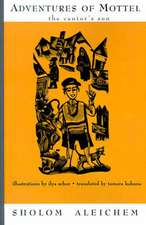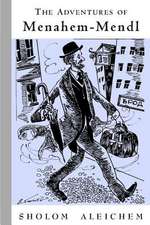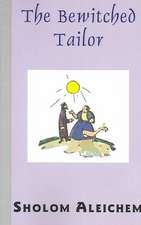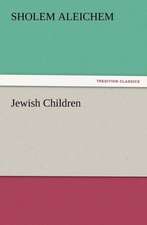Wandering Stars: The Extraordinary Life of a 106-Year-Old Woman
Autor Sholem Aleichem Traducere de Aliza Shevrin Cuvânt înainte de Tony Kushneren Limba Engleză Paperback – 31 iul 2010 – vârsta de la 18 ani
"An uproarious, sprawling masterpiece by a grand Yiddish storyteller."
-O, The Oprah Magazine
Translated in full for the first time, one hundred years after its original publication, the acclaimed epic love story set in the colorful world of the Yiddish theater. Wandering Stars spans ten years and two continents, relating the adventures of Reizel and Leibel, young shtetl dwellers in late nineteenth-century Russia who fall under the spell of a traveling acting company. Together they run away from home to become entertainers themselves, and then tour separately around Europe, ultimately reuniting in New York. Wandering Stars is an engrossing romance, a great New York story, and an anthem for the magic of the theater.
-O, The Oprah Magazine
Translated in full for the first time, one hundred years after its original publication, the acclaimed epic love story set in the colorful world of the Yiddish theater. Wandering Stars spans ten years and two continents, relating the adventures of Reizel and Leibel, young shtetl dwellers in late nineteenth-century Russia who fall under the spell of a traveling acting company. Together they run away from home to become entertainers themselves, and then tour separately around Europe, ultimately reuniting in New York. Wandering Stars is an engrossing romance, a great New York story, and an anthem for the magic of the theater.
Preț: 129.68 lei
Nou
Puncte Express: 195
Preț estimativ în valută:
24.82€ • 25.58$ • 20.95£
24.82€ • 25.58$ • 20.95£
Carte tipărită la comandă
Livrare economică 03-17 martie
Preluare comenzi: 021 569.72.76
Specificații
ISBN-13: 9780143117452
ISBN-10: 0143117459
Pagini: 457
Dimensiuni: 163 x 215 x 26 mm
Greutate: 0.4 kg
Editura: Penguin Books
ISBN-10: 0143117459
Pagini: 457
Dimensiuni: 163 x 215 x 26 mm
Greutate: 0.4 kg
Editura: Penguin Books
Notă biografică
Sholem Aleichem is the pen name of Sholem Rabinovitch (1859-1916), the most beloved writer in Yiddish literature. Born in Russia, he fled the pogroms and immigrated to New York in 1905.
Aliza Shevrin is the foremost translator of Sholem Aleichem, having translated eight other volumes of his fiction. She lives in Ann Arbor.
Aliza Shevrin is the foremost translator of Sholem Aleichem, having translated eight other volumes of his fiction. She lives in Ann Arbor.
Extras
Chapter 1
The Bird Has Flown
One bright Sunday morning toward the end of summer, Leah the cantor's wife awoke with a start. She suddenly remembered it was Sunday, market day. Glancing out the window, she saw broad daylight. "What's the matter with me! It's late!" she exclaimed. She dressed hurriedly, splashed water over her fingertips, ran through her morning prayers, grabbed her basket, and sped off to the market, afraid she would miss all the bargains.
It was a beautiful morning. A warm sun bathed Holeneshti in its golden rays. Once she reached the market, Leah was like a fish in water—she was in her element. The sheer size of the Holeneshti market was something to behold. The Moldavian peasants had brought in sheep's milk and cheese, and great quantities of vegetables from their gardens—corn, greens, and cucumbers, all selling for a song, as well as onions, garlic, and bitter herbs. With all these plentiful choices before her, Leah quickly negotiated a basketful. And the fish! A heaven-sent bargain! She had not planned to buy fish, but suddenly there they were. But please imagine what fish—tiny, skinny, scrawny little things, all bone, barely a mouthful, but so cheap it would be a shame to turn them down. No one would believe it! Yes, Leah, was having a lucky day at the market. Of the one ruble she had brought, quite a bit was still left. With so much still unspent, she thought she would surprise the cantor with a gift—ten fresh eggs. Yisroyeli will appreciate that, she thought. It would be enough to make ten throat-soothing honey gogl-mogls. The High Holidays would be here soon—He'll need them to keep his throat in good shape. And how about candies for my Reizel? She loves sweets, confections, snacks—bless her, what a delight that girl is. I only wish I could buy her new shoes. The old ones are worn through and through—useless.
With these thoughts spurring her on the cantor's wife hurried from booth to booth until the rest of the ruble had melted away like snow. Only then could she finally relax and go home.
As she neared her house, she could hear the cantor practicing his prayers: "Mee-ee-ee ba-a-esh u'mee-ee-ee bamayim!" That sweet familiar voice had given her pleasure for so long, but she never tired of it. Yisroyeli the cantor was practicing a brand new U'netaneh tokef to chant for Rosh Hashanah. He was not one of your great cantors with a worldwide reputation, but in his own Holeneshti he was famous enough. You can be sure the town would never have exchanged him for the greatest cantor, not even one with his own choir, nor let him go for a million rubles! But that's neither here nor there. Yisroyeli the cantor also taught on the side—without it the family would never have been able to manage. Luckily he was a fine biblical scholar with a talent for teaching Hebrew. In addition, God had blessed him with a fine hand to pen letters for those who could not write. He had ten students, the richest children in town. One of his prize pupils was the son of Benny Rafalovitch, the richest man in town. Two incomes are nothing to sneeze at. Nonetheless, despite his chanting and his teaching, he and Leah often did not have enough to eat for Shabbes. Still, they would not die of hunger—somehow they would find a way.
Arriving home, carrying a full basket from the market, perspiring, Leah was surprised to find that her daughter did not show her face. Usually Reizel, was already dressed and washed, her hair combed, running to greet her. She'd poke around in her basket: "Mama, what did you bring me?" "Wait a minute," Leah would say, "what's the hurry? First let me get your father his glass of chicory."
That was what the cantor's wife was expecting today. But the house was quiet, strangely quiet. Reizel was nowhere to be seen or heard though the door was open. Was it possible she was still asleep? The cantor continued to warble, reaching the highest notes with a sob, "Ach, mee-ee-ee ba-eysh umee-ee-ee bamayim!" And again, "Mee-ee-ee ba-a-esh umee-ee-ee bamayim."
Quietly, Leah tiptoed into the house and set the basket down in a corner. So as not to disturb her husband in his work, she busied herself at the stove, all the while muttering: "God in heaven! Is she still asleep? These young girls! The students are coming to class any minute now, and she'll be walking around half-naked right in front of them. She thinks she's still a child.
"Yisroyeli! Yisroyeli? No, he can't hear me. He's too wrapped up in his ba-eyshes and bamayims prayers this morning. God help us! Someone might think they're stuffing his pockets with gold for his chanting. And here Reizel walks around in worn-out shoes, may I suffer her pains. How long is she going to sleep! I have to wake the child up!"
With these words, Leah hurried to the curtain that divided the room and listening quietly for a moment. Then she slowly lifted the curtain with two fingers. She peered in the bed, looked toward the open window—and froze, unable to speak. Feeling as if someone had struck her heart with a stone, she turned to her husband:
"Yisroyeli!"
The intensity of her voice immediately stopped Yisroyeli's singing. "What is it, Leah?"
"Where is Reizel?"
"What do you mean, where is Reizel? Isn't she asleep?"
***
Within half an hour the news had spread through the town about the cantor's misfortune. People streamed into the house to find out what had happened. "Is she really gone? How is this possible? How could this have happened?"
For the rest of the morning the town seethed like a kettle: "Have you heard? The cantor's daughter is gone!" "What do you mean? Where has she gone? "Gone—as if she had sunk into the earth."
And the cantor? How to describe him? He neither cried nor spoke. He stood in the middle of the room like a statue, staring at the empty bed mutely, as if words and even reason itself had failed him. His wife, however, was tearing around the town like a mad woman, wringing her hands, and beating herself in the head, crying out to the heavens, "My daughter! My child! My precious!" Trooping after her, the townspeople helped her search. They hunted everywhere, in every corner—across the bridge, in the cemetery, in all the Wallachian gardens, and even in the lake. Gone!
Half dead, the cantor's wife was carried home to a house full of people, all talking about the tragedy that had befallen the cantor in his own home. Some pulled back the curtain to gaze at the empty bed and the open window. "So it was from here the bird flew away?" they wondered. Leave it to the people of Holeneshti to come up with a clever way of putting it.
Chapter 2
She Faints Away
Every Jewish town, no matter how poor, must have its own Rothschild. The Rothschild of Holeneshti was Benny Rafalovitch. To tell you all about his wealth and position would be too much. It will suffice simply to describe how many sat at his table. Each and every day at Benny's table you would find no fewer than twenty people: sons, daughters, sons-in-law, daughters-in-law. All were handsome, healthy, well-fed souls with full round faces. Among them was also an old grandmother whose head shook from side to side, as if saying, "No no!"; a nursemaid, pale as an underdone roll but with a flush high on her cheeks; and a young man, a distant relative, who oversaw the household accounts. This young man's name was Simcha but everyone called him Sison v'Simcha, which means "joy and gladness." Not that he was such a happy creature—on the contrary, he was by nature a cheerless, melancholy sort with a sleepy demeanor. He had black, shiny hair, puffy eyes, and a constantly stuffed nose that made it difficult for him to properly pronounce his m's and n's, and his full and thickly mustached upper lip didn't help.
We will have the opportunity to become acquainted with this family in due time, but in general we can say that theirs was a wealthy, happy, lively household that was most fond of eating. When it came time for them to eat, one could have gone deaf from the uproar, the din, the clatter of spoons and forks.
At the head of the table, like a king, sat the master of the house himself, Benny, a Bessarabian Jew with a substantial belly and beard that grew horizontally. Yes, it parted to the left and to the right, not like an ordinary beard, and it refused to lie flat as it should. But he could do nothing about it, try as he might!
When Benny ate, he threw himself into it—nothing could distract him. He hated doing two things at once anyway, but when eating he refused to be bothered about anything else. He spoke very little but didn't mind when others spoke. When a clamor erupted at the table, he would shout, "Quiet down, you scamps! Better look into your prayer books and pay attention to what you are reciting!" By this he meant they should look into their plates and pay attention to what they were eating. It was his way to speak elliptically. For instance, he called a horse a "fellow," money was "shards," a wife was a "disaster," a son was a "kaddish," a daughter a "blister," bread a "thread," a house an "attic," an alcove a "hole,"—an so on. One could have created a whole new dictionary from Benny Rafalovitch's vocabulary.
At the opposite head of the table sat, Benny's wife, Beylke, a tiny, frail, quiet woman, unheard and unseen. Looking at her, you would ask yourself: Was this the woman who brought into the world all these children? But don't be fooled— this tiny woman bore on her shoulders the weight of the entire household. Always busy, she took on everyone's pain as her own. She asked nothing for herself but instead devoted her life to her children. In this respect she was following in the footsteps of her aged mother-in-law, whose head shook in a constant "no no." This old mother had apparently been created to remind people of the death.
Having lost almost all her sense, the grandmother still had one—a sharp eye. She saw everything before anyone else did. So no one besides her had noticed that the youngest boy, Leibel, was missing. Scanning the long table with her sharp eye, the old lady had noticed immediately. Her head shaking, she exclaimed, "Where in the world is Leibel?"
They all looked around and saw that Leibel was missing. They began searching for him everywhere. "Where is Leibel?" they all wondered.
As long as Benny's household had existed, it had never happened that a child was missing from the dinner table. The father became angry and commanded: "Let them bring the youngest lamb from the flock!" Benny meant that they were to bring the youngest one from the cheder. They sent a messenger to Yisroyeli the cantor's cheder to bring Leibel home for supper.
The Rafalovitches were already eating the last course, the fresh corn, when the messenger returned with the news that Leibel had not gone to the cantor's house that day and that a tragedy, may it not happen here, had befallen the cantor and his wife: their daughter, their only daughter, had vanished during the night without a trace.
This news hit the family like a bombshell. They sat staring at one another. What each of them was thinking at that moment was hard to know—they kept their thoughts to themselves. Only the old lady, who was used to speaking her mind, said loudly and clearly, as her head wobbled: "Have a look in the desk drawer. I could swear that in the middle of the night I heard someone stirring in the dark while the young man"—she indicated Sison v'Simcha—"was snoring so loudly he could have woke the dead."
Old people have such odd ideas! What did she mean, Sison v'Simcha was snoring? If a fly were to alight in the room, he would have heard it, so light was his sleep! Still and all, the sleepy bookkeeper stood up with effort, took his time wiping off his hairy upper lip with his greasy hand, and fished out a ring of keys from his trouser pocket. Slowly, unhurriedly, he unlocked the middle drawer of the oaken desk, peered inside—and stood paralyzed. His sleepy, puffy eyes seemed to glaze over, and he could not speak so much as a word.
Benny came to his aid: "For God's sake, speak!" he thundered, so loudly that Sison v'Simcha began to shake.
Though tongue-tied and snuffling through his stuffed nose, the bookkeeper found words: "Believe me, these keys were with me all night, in my pants pocket. Believe me, I didn't sleep a wink, heard not the slightest noise. Come see for yourself—the drawer is now empty, not a trace!"
At these words someone at the table uttered a stifled scream, keeled over, and fell into a faint.
It was tiny, frail, quiet little Beylke.
The Bird Has Flown
One bright Sunday morning toward the end of summer, Leah the cantor's wife awoke with a start. She suddenly remembered it was Sunday, market day. Glancing out the window, she saw broad daylight. "What's the matter with me! It's late!" she exclaimed. She dressed hurriedly, splashed water over her fingertips, ran through her morning prayers, grabbed her basket, and sped off to the market, afraid she would miss all the bargains.
It was a beautiful morning. A warm sun bathed Holeneshti in its golden rays. Once she reached the market, Leah was like a fish in water—she was in her element. The sheer size of the Holeneshti market was something to behold. The Moldavian peasants had brought in sheep's milk and cheese, and great quantities of vegetables from their gardens—corn, greens, and cucumbers, all selling for a song, as well as onions, garlic, and bitter herbs. With all these plentiful choices before her, Leah quickly negotiated a basketful. And the fish! A heaven-sent bargain! She had not planned to buy fish, but suddenly there they were. But please imagine what fish—tiny, skinny, scrawny little things, all bone, barely a mouthful, but so cheap it would be a shame to turn them down. No one would believe it! Yes, Leah, was having a lucky day at the market. Of the one ruble she had brought, quite a bit was still left. With so much still unspent, she thought she would surprise the cantor with a gift—ten fresh eggs. Yisroyeli will appreciate that, she thought. It would be enough to make ten throat-soothing honey gogl-mogls. The High Holidays would be here soon—He'll need them to keep his throat in good shape. And how about candies for my Reizel? She loves sweets, confections, snacks—bless her, what a delight that girl is. I only wish I could buy her new shoes. The old ones are worn through and through—useless.
With these thoughts spurring her on the cantor's wife hurried from booth to booth until the rest of the ruble had melted away like snow. Only then could she finally relax and go home.
As she neared her house, she could hear the cantor practicing his prayers: "Mee-ee-ee ba-a-esh u'mee-ee-ee bamayim!" That sweet familiar voice had given her pleasure for so long, but she never tired of it. Yisroyeli the cantor was practicing a brand new U'netaneh tokef to chant for Rosh Hashanah. He was not one of your great cantors with a worldwide reputation, but in his own Holeneshti he was famous enough. You can be sure the town would never have exchanged him for the greatest cantor, not even one with his own choir, nor let him go for a million rubles! But that's neither here nor there. Yisroyeli the cantor also taught on the side—without it the family would never have been able to manage. Luckily he was a fine biblical scholar with a talent for teaching Hebrew. In addition, God had blessed him with a fine hand to pen letters for those who could not write. He had ten students, the richest children in town. One of his prize pupils was the son of Benny Rafalovitch, the richest man in town. Two incomes are nothing to sneeze at. Nonetheless, despite his chanting and his teaching, he and Leah often did not have enough to eat for Shabbes. Still, they would not die of hunger—somehow they would find a way.
Arriving home, carrying a full basket from the market, perspiring, Leah was surprised to find that her daughter did not show her face. Usually Reizel, was already dressed and washed, her hair combed, running to greet her. She'd poke around in her basket: "Mama, what did you bring me?" "Wait a minute," Leah would say, "what's the hurry? First let me get your father his glass of chicory."
That was what the cantor's wife was expecting today. But the house was quiet, strangely quiet. Reizel was nowhere to be seen or heard though the door was open. Was it possible she was still asleep? The cantor continued to warble, reaching the highest notes with a sob, "Ach, mee-ee-ee ba-eysh umee-ee-ee bamayim!" And again, "Mee-ee-ee ba-a-esh umee-ee-ee bamayim."
Quietly, Leah tiptoed into the house and set the basket down in a corner. So as not to disturb her husband in his work, she busied herself at the stove, all the while muttering: "God in heaven! Is she still asleep? These young girls! The students are coming to class any minute now, and she'll be walking around half-naked right in front of them. She thinks she's still a child.
"Yisroyeli! Yisroyeli? No, he can't hear me. He's too wrapped up in his ba-eyshes and bamayims prayers this morning. God help us! Someone might think they're stuffing his pockets with gold for his chanting. And here Reizel walks around in worn-out shoes, may I suffer her pains. How long is she going to sleep! I have to wake the child up!"
With these words, Leah hurried to the curtain that divided the room and listening quietly for a moment. Then she slowly lifted the curtain with two fingers. She peered in the bed, looked toward the open window—and froze, unable to speak. Feeling as if someone had struck her heart with a stone, she turned to her husband:
"Yisroyeli!"
The intensity of her voice immediately stopped Yisroyeli's singing. "What is it, Leah?"
"Where is Reizel?"
"What do you mean, where is Reizel? Isn't she asleep?"
***
Within half an hour the news had spread through the town about the cantor's misfortune. People streamed into the house to find out what had happened. "Is she really gone? How is this possible? How could this have happened?"
For the rest of the morning the town seethed like a kettle: "Have you heard? The cantor's daughter is gone!" "What do you mean? Where has she gone? "Gone—as if she had sunk into the earth."
And the cantor? How to describe him? He neither cried nor spoke. He stood in the middle of the room like a statue, staring at the empty bed mutely, as if words and even reason itself had failed him. His wife, however, was tearing around the town like a mad woman, wringing her hands, and beating herself in the head, crying out to the heavens, "My daughter! My child! My precious!" Trooping after her, the townspeople helped her search. They hunted everywhere, in every corner—across the bridge, in the cemetery, in all the Wallachian gardens, and even in the lake. Gone!
Half dead, the cantor's wife was carried home to a house full of people, all talking about the tragedy that had befallen the cantor in his own home. Some pulled back the curtain to gaze at the empty bed and the open window. "So it was from here the bird flew away?" they wondered. Leave it to the people of Holeneshti to come up with a clever way of putting it.
Chapter 2
She Faints Away
Every Jewish town, no matter how poor, must have its own Rothschild. The Rothschild of Holeneshti was Benny Rafalovitch. To tell you all about his wealth and position would be too much. It will suffice simply to describe how many sat at his table. Each and every day at Benny's table you would find no fewer than twenty people: sons, daughters, sons-in-law, daughters-in-law. All were handsome, healthy, well-fed souls with full round faces. Among them was also an old grandmother whose head shook from side to side, as if saying, "No no!"; a nursemaid, pale as an underdone roll but with a flush high on her cheeks; and a young man, a distant relative, who oversaw the household accounts. This young man's name was Simcha but everyone called him Sison v'Simcha, which means "joy and gladness." Not that he was such a happy creature—on the contrary, he was by nature a cheerless, melancholy sort with a sleepy demeanor. He had black, shiny hair, puffy eyes, and a constantly stuffed nose that made it difficult for him to properly pronounce his m's and n's, and his full and thickly mustached upper lip didn't help.
We will have the opportunity to become acquainted with this family in due time, but in general we can say that theirs was a wealthy, happy, lively household that was most fond of eating. When it came time for them to eat, one could have gone deaf from the uproar, the din, the clatter of spoons and forks.
At the head of the table, like a king, sat the master of the house himself, Benny, a Bessarabian Jew with a substantial belly and beard that grew horizontally. Yes, it parted to the left and to the right, not like an ordinary beard, and it refused to lie flat as it should. But he could do nothing about it, try as he might!
When Benny ate, he threw himself into it—nothing could distract him. He hated doing two things at once anyway, but when eating he refused to be bothered about anything else. He spoke very little but didn't mind when others spoke. When a clamor erupted at the table, he would shout, "Quiet down, you scamps! Better look into your prayer books and pay attention to what you are reciting!" By this he meant they should look into their plates and pay attention to what they were eating. It was his way to speak elliptically. For instance, he called a horse a "fellow," money was "shards," a wife was a "disaster," a son was a "kaddish," a daughter a "blister," bread a "thread," a house an "attic," an alcove a "hole,"—an so on. One could have created a whole new dictionary from Benny Rafalovitch's vocabulary.
At the opposite head of the table sat, Benny's wife, Beylke, a tiny, frail, quiet woman, unheard and unseen. Looking at her, you would ask yourself: Was this the woman who brought into the world all these children? But don't be fooled— this tiny woman bore on her shoulders the weight of the entire household. Always busy, she took on everyone's pain as her own. She asked nothing for herself but instead devoted her life to her children. In this respect she was following in the footsteps of her aged mother-in-law, whose head shook in a constant "no no." This old mother had apparently been created to remind people of the death.
Having lost almost all her sense, the grandmother still had one—a sharp eye. She saw everything before anyone else did. So no one besides her had noticed that the youngest boy, Leibel, was missing. Scanning the long table with her sharp eye, the old lady had noticed immediately. Her head shaking, she exclaimed, "Where in the world is Leibel?"
They all looked around and saw that Leibel was missing. They began searching for him everywhere. "Where is Leibel?" they all wondered.
As long as Benny's household had existed, it had never happened that a child was missing from the dinner table. The father became angry and commanded: "Let them bring the youngest lamb from the flock!" Benny meant that they were to bring the youngest one from the cheder. They sent a messenger to Yisroyeli the cantor's cheder to bring Leibel home for supper.
The Rafalovitches were already eating the last course, the fresh corn, when the messenger returned with the news that Leibel had not gone to the cantor's house that day and that a tragedy, may it not happen here, had befallen the cantor and his wife: their daughter, their only daughter, had vanished during the night without a trace.
This news hit the family like a bombshell. They sat staring at one another. What each of them was thinking at that moment was hard to know—they kept their thoughts to themselves. Only the old lady, who was used to speaking her mind, said loudly and clearly, as her head wobbled: "Have a look in the desk drawer. I could swear that in the middle of the night I heard someone stirring in the dark while the young man"—she indicated Sison v'Simcha—"was snoring so loudly he could have woke the dead."
Old people have such odd ideas! What did she mean, Sison v'Simcha was snoring? If a fly were to alight in the room, he would have heard it, so light was his sleep! Still and all, the sleepy bookkeeper stood up with effort, took his time wiping off his hairy upper lip with his greasy hand, and fished out a ring of keys from his trouser pocket. Slowly, unhurriedly, he unlocked the middle drawer of the oaken desk, peered inside—and stood paralyzed. His sleepy, puffy eyes seemed to glaze over, and he could not speak so much as a word.
Benny came to his aid: "For God's sake, speak!" he thundered, so loudly that Sison v'Simcha began to shake.
Though tongue-tied and snuffling through his stuffed nose, the bookkeeper found words: "Believe me, these keys were with me all night, in my pants pocket. Believe me, I didn't sleep a wink, heard not the slightest noise. Come see for yourself—the drawer is now empty, not a trace!"
At these words someone at the table uttered a stifled scream, keeled over, and fell into a faint.
It was tiny, frail, quiet little Beylke.
Descriere
Translated in full for the first time, 100 years after its original publication, the acclaimed epic love story set in the colorful world of Yiddish theater.
















